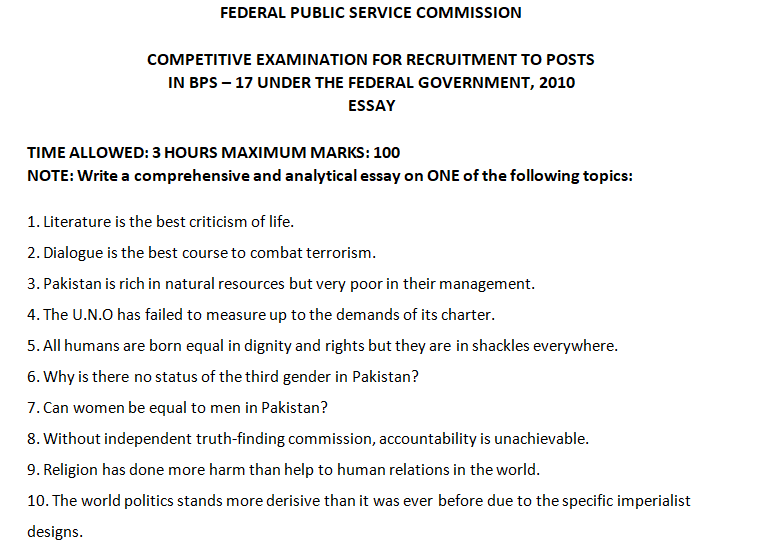CSS Essay Paper 2010
- Literature is the best criticism of life.
- Dialogue is the best course to combat terrorism.
- Pakistan is rich in natural resources but very poor in their management.
- The U.N.O has failed to measure up to the demands of its charter.
- All humans are born equal in dignity and rights but they are in shackles everywhere.
- Why is there no status of the third gender in Pakistan?
- Can women be equal to men in Pakistan?
- Without an independent truth-finding commission, accountability is unachievable.
- Religion has done more harm than help to human relations in the world.
- The world politics stands more derisive than it was ever before due to the specific imperialist designs.
Summaries of Essays
Here are simplified summaries of the additional essays:
1. Literature is the Best Criticism of Life
This essay argues that literature, through stories, poems, and plays, reflects real-life experiences and critiques societal issues. The writer suggests that literature helps readers understand human nature, society, and morality by showcasing the complexities of life and its problems.
2. Dialogue is the Best Course to Combat Terrorism
This essay emphasizes the importance of dialogue and communication in addressing the root causes of terrorism. It suggests that engaging in open discussions with different communities, countries, and ideologies can help reduce misunderstandings, foster peace, and prevent extremism.
3. Pakistan is Rich in Natural Resources but Very Poor in Their Management
This essay highlights Pakistan’s abundant natural resources, such as minerals, water, and agricultural land, but points out the country’s inability to manage these resources effectively. It argues that poor governance, corruption, and lack of infrastructure hinder the country’s development despite its resource wealth.
4. The U.N.O Has Failed to Measure Up to the Demands of Its Charter
This essay criticizes the United Nations Organization (UNO) for failing to fulfill its goals of promoting peace, justice, and human rights worldwide. It argues that the UNO’s inefficiency, political conflicts among member countries, and lack of enforcement power have led to its inability to address global challenges effectively.
5. All Humans Are Born Equal in Dignity and Rights, but They Are in Shackles Everywhere
This essay discusses the contradiction between the universal human rights declaration and the reality of inequality worldwide. It highlights issues like poverty, discrimination, and political oppression, arguing that while people are born with equal rights, societal systems often fail to provide them.
6. Why is There No Status of the Third Gender in Pakistan?
This essay explores the issue of the third gender in Pakistan, focusing on how society and the legal system marginalize people who do not fit into traditional gender categories. The writer calls for recognition of the third gender’s rights, equal treatment, and inclusion in social, political, and legal frameworks.
7. Can Women Be Equal to Men in Pakistan?
This essay discusses the challenges women face in Pakistan, such as discrimination, limited opportunities, and social constraints. The writer argues that true gender equality can be achieved with education, legal reforms, and a shift in societal attitudes, but acknowledges that much work remains to overcome deep-rooted cultural barriers.
8. Without an Independent Truth-Finding Commission, Accountability is Unachievable
This essay stresses the need for an independent truth-finding commission to investigate corruption, human rights violations, and injustices. It argues that without transparency and accountability, a fair and just society cannot function. The writer advocates for institutions that ensure justice and expose wrongdoing.
9. Religion Has Done More Harm Than Help to Human Relations in the World
This essay critiques the role of religion in causing conflict and division among people. It highlights historical and contemporary instances where religious differences have led to wars, intolerance, and oppression. The writer suggests that while religion has brought comfort to some, it has also been a source of violence and misunderstanding.
10. The World Politics Stands More Derisive Than It Was Ever Before Due to the Specific Imperialist Designs
This essay discusses how global politics today is more divisive and unstable due to the ongoing influence of imperialist powers. The writer argues that certain countries, driven by imperialist motives, manipulate international relations to maintain control, creating conflicts and deepening divides between nations.
